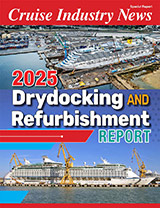The global focus on risk and zero tolerance for accidents has resulted in significant demand for DNV’s services for managing risk. Based on its core competence of identifying, assessing and managing risk in multiple fields, the company has experienced a growth in revenue of 16 per cent from its core activities.
The 2006 financial figures published by Det Norske Veritas (DNV) show that the company achieved a revenue of NOK 7 297 million (USD 1 132 million) last year, producing an operating profit of NOK 794 million (USD 123 million). The profit after tax came to NOK 546 million (USD 85 million).
“A sound financial foundation is required to secure the independence and integrity of DNV’s operations,” says CEO Henrik O. Madsen. “It is gratifying that our positive performance and growth comes during a period when DNV has been especially active in its work to make a positive impact on our customers’ business globally, while safely and responsibly improving their business. This demonstrates that we have customers who value quality highly, and that our services add value.”
The strong growth in the world economy, with a high level of activity in most industries, have resulted in “good financial performance and a long-term order reserve,” says a satisfied Madsen. “This has led to positive developments for DNV, and the company has achieved a growth of 16 percent in its core activities.”
“Following the adoption of a new strategy in June 2006, the past year laid emphasis on shaping and growing the DNV organisation. The business areas have been restructured to reflect a clearer focus, and we recruited 1000 new professionals to gear up for the growth required to meet the targets in our strategy,” explains Madsen. He continues, “The changes have been well received in the marketplace and we have strengthened our position in all the sectors activities throughout 2006.”
Within the field of ship classification, DNV’s share of the world fleet measured in gross tons is approximately 16 per cent. Of the newbuildings contracted during 2006, DNV’s share of the world market was 26 per cent when measured in gross tons. This represents 605 ships. A total of 5 228 trading vessels, representing 113.5 million gross tons, were classed by DNV at year-end, which is an all-time high for DNV.
The demand for risk-related technology and management services has also been high in the oil and gas industries, providing DNV with “exciting projects on all continents” says Madsen. “The North Sea is still the most important area in terms of business revenue, while strong growth is seen in Brazil, North America, India and China. Great opportunities are also opening up in the Barents Sea,” he adds.
DNV is among the world’s three largest companies within accredited quality management system certification, and world leader in environmental management system certification. Madsen points out that there is a clear trend towards more industry-specific certification schemes, which will increase the need for a deep understanding of the various industries.
“As an example, DNV plays an active role in making the emission trading mechanism of the Kyoto Protocol become operational. Services where DNV has a strong international position include validation of projects for emission reduction and verification of actual emission reductions in specific projects,” asserts Madsen.
DNV also recently formed a new operating unit called IT Global Services which helps finance, telecommunications, government, defence, aerospace and automotive sector organisations to achieve more effective IT risk management. “Through the new business area, we extend our ability to identify and control issues and vulnerabilities in the IT-dependent operations of global organisations that want a more predictable return on their IT-investments,” explains Madsen. “This new competence will now also be offered to the marine and energy industries.”
Looking ahead, Madsen believes that the demand for DNV’s services will continue to be high in 2007. “This is based on the assumption of a vibrant world economy, continuously high oil prices and a high level of activity in all our main markets. The order reserve is very satisfactory at the start of this year for all business areas, and we expect sound growth in revenues in 2007.”
“We are committed to further helping our customers develop and implement solutions that address their challenges,” says Madsen and concludes, “the more our activities can be seen as part of their value chain, the greater the impact of our work to safeguard life, property and the environment. In this way we can help realise DNV’s vision to have Global Impact for a Safe and Sustainable Future, as well as our customers’ business goals.”



